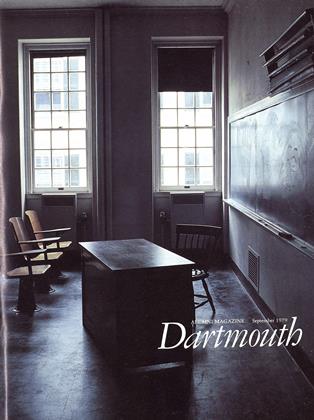It is five o'clock and the volleyball players, fresh from the classroom, have gathered around the net on the thinning grass next to Brown Hall. Policeman Tony Campbell positions himself near the net. The players volley, and the ball comes in Campbell's direction. He's too small to spike it legally, but in one smooth motion his right hand pulls down the net and he spikes the ball powerfully with his left - a point for Campbell's side. Not unexpectedly, the opposing team, made up of mostly other police, protests the point. Quite unexpectedly, the abuse directed at Campbell comes in swift Spanish. The decision: It's a do-over.
What are these lawmen doing outside Brown Hall in Hanover playing volleyball and chiding each other in Spanish? They are some of the 26 New York transit police who gave up vacations with their families in order to spend 16 hours a day for two weeks learning Spanish. The summer pilot program was developed at Dartmouth to provide members of the city's transit force with a working knowledge of New York's second language.
Professor John Rassias was directing the program, and sharing in the instructional theatrics associated with any Dartmouth foreign language course were Professors Frank Janney and Paul Hecht, two members of the Spanish language faculty. Who paid for it all? Funding was obtained through the initiative of Dartmouth senior Dean Esserman, the program's initiator, and provided by donations from four private foundations and banks.
We spoke to officer Campbell on his walk across the Green towards Chase Field where he hoped to catch the last innings of a softball game, along with the last draughts of a keg of beer supplied by none other than Rassias himself. "We all volunteered to come up here," Campbell told us. "About 130 of us volunteered, and 26 were chosen. I don't know why they picked me. Maybe because I work in the Spanish neighborhoods. But all kinds of people ride my train [the famous A Train on the Eighth Avenue line that runs the length of West Side Manhattan], A good cop has to be an actor. You've got to be able to size up who you're talking to."
We passed under the stands at the east end of Memorial Field. Campbell greeted some students at Leverone Field House. In their few spare hours during a two-week stay here, the police officers were introduced to such activities as beer pong and kayaking.
"What have I learned here?" Campbell continued. "Well, I've learned some Spanish, but I've learned some things about the Spanish culture that I didn't know. Like when I talk to the young Spanish people, they always look down and away — kinda like this [he demonstrates]. Well, I always thought they were taking me for a chump. But in the Spanish culture it's disrespectful for a young person to look directly at an adult."
Campbell's thoughts about Hanover: "Boring, but a good place to study." His thoughts on the program: "I wish it were two weeks longer. I'm just getting the hang of it, but once I leave here, and I'm back with my family, I won't get much practice." Campbell walked slowly, and we arrived at Chase Field to find the Softball game well under way. Wearing blue jeans and T-shirts, the police officers and their teachers shared baseball gloves and traded sarcasms while the innings rolled away. Policeman Ben Pepitone of Long Island greeted us and offered beer. We noticed some commotion at home plate. The umpire was defending his ability to see clearly.
Pepitone surveyed his fellow players and remarked, "All the guys are highly motivated. They're all better than average cops." We asked him why he volunteered for the program. "A lot of people.mistake me for Spanish, and I never know what to tell them when they ask for directions," he said. "It would be nice to be able to give directions to people when they ask me. I guess I want to help more people." While we finished the keg, Pepitone volunteered these comments: "John Rassias is the best teacher I've ever had. [Pepitone has a bachelor's degree from New York Tech.] I'm really glad I came. It's beautiful up here, just beautiful. Besides, I always wanted a degree from an Ivy League school."
Pepitone got his wish. Monday morning, July 2, was graduation day. The officers donned their uniform blues with white gloves and marched from Brown Hall to the Bema in ranks of four. They counted cadence in Spanish. The bells of Baker Tower accompanied them and pealed with such unfamiliar (to Hanover) tunes as "I Love New York," "The Sidewalks of New York," and "School Days." After the ceremony, there was much picture-taking, and the officers invited some of the undergraduates they knew to stand for some pictures with them. Pepitone called to us from across the Bema — but in Spanish, of course.
Daily lesson: transit policeman Tony Campbell playing "Spanish bingo" at Dartmouth.
 View Full Issue
View Full Issue
More From This Issue
-
 Feature
FeatureUps and Downs in the Big Leagues
September 1979 By Keith Bellows -
 Feature
FeatureTemples, Turtles and Fat Boys
September 1979 By Dan Nelson -
 Feature
FeatureThe Kids Danced
September 1979 By Robert Feakins -
 Article
ArticleThe Bard's American Friend
September 1979 By Michael Colacchio '80 -
 Class Notes
Class Notes1954
September 1979 By JOHN L. GILLESPIE, Fred Alpert '54 -
 Class Notes
Class Notes1974
September 1979 By WILLIAM B. CATER JR.
Article
-
 Article
ArticleAMOS TUCK SCHOOL CLEARING HOUSE
June, 1926 -
 Article
ArticleSeptember Convocation
June 1957 -
 Article
ArticleHOW TO COVER A WAR
October 1943 By A.J. LIEBLING '24 -
 Article
ArticleBASKETBALL
JANUARY 1968 By ALBERT C. JONES '66 -
 Article
ArticleIS TITO COMMUNISM'S LUTHER?
April 1950 By JOHN CLINTON ADAMS -
 Article
ArticleLost in the Translations
NOVEMBER 1998 By Wing-Tsit Chan, 1963, Robert Henricks, 1 more ...


